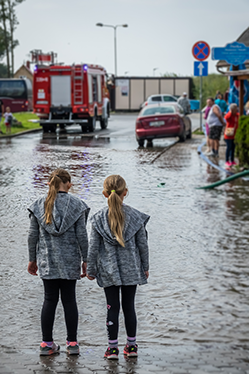Extreme Weather and Preschool-Aged Children
Explore Other Kids and Climate Health Impacts
Find information on how climate change can affect extreme weather and children’s health. Start by reading the fictional story of a preschool-aged child who is struggling after a flood event, and learn how similar situations can affect kids across the country. Also get tools to help families prepare and cope with these kinds of climate disasters. Finally, check out the regional spotlight.
Hayden's Story
A preschool-aged child named Hayden lives in a small island community. He hears news reports about a large storm headed for his community. Because of this, Hayden is experiencing high levels of stress. The family relocates to a shelter for the duration of the storm, where Hayden has trouble sleeping and misses his home. After the storm, many buildings are destroyed, including Hayden's preschool, which causes major disruptions to Hayden’s everyday life.

Climate Change Impacts
- Several types of extreme events, including flooding, are predicted to intensify with climate change. These extreme events are likely to have impacts on the natural environment and built infrastructure and may require relocation.1
- Since the 1980s, hurricanes have been intensifying more rapidly and causing heavier rainfall and higher storm surges. This also means communities may have less time to prepare for extreme events.
- Hurricanes typically lose energy as they move inland, but the rate of this energy loss has decreased since the 1960s. This means storms have been extending farther inland.2
- Hurricane damage in the United States has generally increased since 1900.2
Impacts on Children’s Mental Health
- Children's brains continue to grow through adolescence and they are still developing emotionally.
- Children can experience mental health impacts from extreme climate events, and these events are expected to increase with climate change. Associated impacts like the possible need for relocation can have additional impacts on children’s mental health. The trauma related to the stress and anxiety about the possibility of an extreme event occurring can similarly lead to PTSD and lifelong mental health consequences.
- It can be difficult for children to understand that disasters cannot always be controlled or predicted.3
- The typical signs of stress differ by age group. Some typical signs by age group include:
- Preschool age: having bad dreams, acting younger than their actual age, complaining often about illnesses like stomachaches, no longer enjoying activities they typically enjoy, and being irritable.
- Elementary and middle school age: having concerns about the safety of themselves or others, irrational fears, nightmares and sleep problems, difficulty in school, complaining of headaches or stomachaches with no underlying cause, and not enjoying activities they typically enjoy.
- High school age: feeling self-conscious or guilty about their feelings, not enjoying activities they typically enjoy, having difficulty concentrating, acting impulsivity, and experiencing emotional numbness.3
What can I do?
- DO work with your family to create an emergency plan so that children know what to expect in the event of an emergency. Learn about making an emergency plan for your family.
- DO provide healthy outlets for managing stress. For preschool- and school-aged children, this could include drawing or painting pictures about the experience or how they feel, playing with clay, playing music, or making puppet shows or plays about the event.
- DO understand the signs of stress in children and how these signs differ by age group. Seek professional counseling support, especially if your children cannot express their feelings, their behavior changes dramatically, they begin to struggle significantly at school, they begin to show frequent aggressive emotional outbursts, they withdraw from friends and family, or they express suicidal ideas. Learn more about signs of stress. (pdf)
- DO encourage healthy habits. A healthy mind starts with rebuilding physical health after a relocation. Restore daily activities and habits as much as possible. Learn more about disaster-related stress. (pdf)
- When talking to children about disasters, DO provide them with the appropriate amount of detail for their age and validate their feelings and emotions. Give preschoolers small bits of information relating to their questions to avoid confusing them. Learn more about helping children cope with disaster. (pdf)
- It is okay to let children know that adults do not have all of the answers. Instead, DO communicate things you do know, like plans for their schooling, your work, or housing. Learn more about dealing with relocation stress. (pdf)
The U.S. Caribbean includes Puerto Rico and the U.S. Virgin Islands.
- In the U.S. Caribbean, the number of Category 4 and 5 tropical cyclones are projected to increase due to climate change.4
- After Hurricane Maria in 2017, many Puerto Ricans went nearly a year without power. The impacts of the storm are still being felt.4
- There is some indication within Puerto Rico that tropical cyclone rainfall rates are increasing, increasing the likelihood of extreme events like Hurricane Maria.4
- Surveys reveal that youth reported high levels of post-traumatic stress disorder and symptoms of depression after Hurricane Maria. A survey of more than 90,000 students found that over 80% saw houses damaged, over 45% experienced damage to their own homes, nearly 30% thought their lives were at risk, and over 15% had no electricity for five to nine months after the hurricane.5
More Resources
- ATSDR: Relocation (pdf)
- U.S. Department of Health and Human Services: Behavioral Health Stressors
- HHS: Office of Climate Change and Health Equity
- HHS: Climate and Health Outlook
- SAMHSA: Climate Change and Trauma
- SAMHSA: Disaster Distress Helpline
- SAMHSA: Disaster Technical Assistance Center
- ATSDR: Community Stress Resource Center
- Administration for Strategic Preparedness and Response: Technical Resources, Assistance Center, and Information Exchange
- Disaster Distress Helpline for Crisis Support
- NASA: Climate Kids—Resources for Teaching Kids About Climate Change
- HealthyChildren.Org: How to Talk with Children about Climate Change
- Administration for Strategic Preparedness and Response: Populations with Access and Functional Needs
